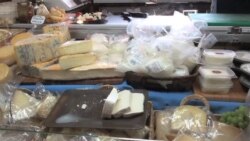Russia is expected to extend a ban on Western food imports in response to the European Union's reported decision to continued sanctions against Russia over its actions in Ukraine.
The ban has raised prices in Russia for scarce European meat and cheese, but also spurred local producers to fill the gap. One Italian shop in Moscow has made a clever advertisement making light of the political tensions.
A video advertisement for Don Guilio's Italian Delicatessen in Moscow cleverly plays on Russia's trade embargo against Western foods.
Delicatessen marketing
The tongue-in-cheek marketing shows the delicatessen setting up a rotating billboard advertisement with a camera on top promising “forbidden” Italian delicacies.
Computer experts are shown developing a “facial recognition technology” that the camera supposedly uses to recognize police.
When police walk by the “forbidden” advertisement, their badges or insignias are recognized and the ad rotates to show another promotion – for a shop selling Matryoshka dolls, the traditional Russian nesting dolls.
Making fun of the political tensions, the advert points out how close the billboard is located to the Russian Interior Ministry building.
The ban, of course, only covers new imports and not existing stocks, which owner Giulio Zompi says he increased dramatically before Russia stopped the trade.
“This was the first effect; it was quite difficult financially,” Zompi says, “because we make [bought] a huge quantity of these products.”
The ban is a retaliatory response to European Union sanctions against Russian banks, energy firms, military, and individuals linked to the crisis in Ukraine.
Western governments say Russia is fueling the conflict with weapons and troops, which the Kremlin denies despite mounting evidence.
Market items are scarce
The trade restriction has made Italian and other European cheese noticeably scarce in Russian supermarkets.
But while it made getting products for his shop and Italian restaurant a challenge, Zompi says he also saw it as an opportunity to step-up his own cheese production to avoid the import ban entirely.
“After embargo, but we start even a bit before, to increase the Italian products made in Russia, made by Italians,” he said. “We even create a small logo that it's made in Russia by Italians. And, we start to produce some cheese and some meat.”
Zompi says he utilizes Italian technology and know-how, which he also uses to roast Italian-style coffee beans.
Italian-speaking staff carve up thick slices of focaccia bread and thin slices of cheese and meat for customers. Full of Italian products, such as wine and ingredients for pasta, one could easily get the impression of being in Italy.
But Russia's economic crisis, brought on by low oil prices and Western sanctions, deterred spending on pricier cheese.
Combined with Russia's loosening of the ban to allow cheese that is lactose-free, the shop is almost back to being fully stocked, Zompi says.
“Parmigiano Reggiano and Grana Padano, that are very missing in a small shop like this, now are without lactose, are starting to be imported,” he said. “So we've almost all the products that we need ... except salami.”
Perfecting flavor
Zompi says he is working on a salami as well, but is still perfecting the flavor so it tastes genuinely Italian.
He says Russian producers of Italian cheese, who are trying to grab some of the domestic market left open because of the import ban, cannot quite get the taste right.
Zompi says some do not have the experience or technology, while others simply want to make quick cash with lower-quality products.
Russian cheese maker Danil Sokolov disputes the notion that only Europeans can make European cheese.
“If a European producer came here and tried it here, only after that we let him say whether the taste is the same or not,” Sokolov says. “One can't say our cheeses are tasteless without trying them.”
Sokolov manages “Koza Nostra,” a play on the Russian word for goat and slang for Italian-American mafia.
He says demand for his goat cheese has skyrocketed and helped them break even for the first time in five years.
Praises Western sanctions
Standing in a goat pen on the company's farm about 120 kilometers north of Moscow, and wearing a T-shirt with President Vladimir Putin's face on it, Sokolov praises Western sanctions against Russia for sparking the Kremlin's Western food ban.
“If the sanctions are prolonged – and we want them to be prolonged, say, for 10 years, so that we have our market closed – we'll develop our own internal market for our national producers," he said.
“That will have a very good effect on us," he added.
Sokolov says if the ban is lifted too soon, his goat cheese ricotta, crème de chèvre, bûche de chèvre and camembert will not be able to compete with less expensive European imports.
In the meantime, Italian restaurants in Russia are more reliant on local artisan producers to make up for the shortfall from the ban.










